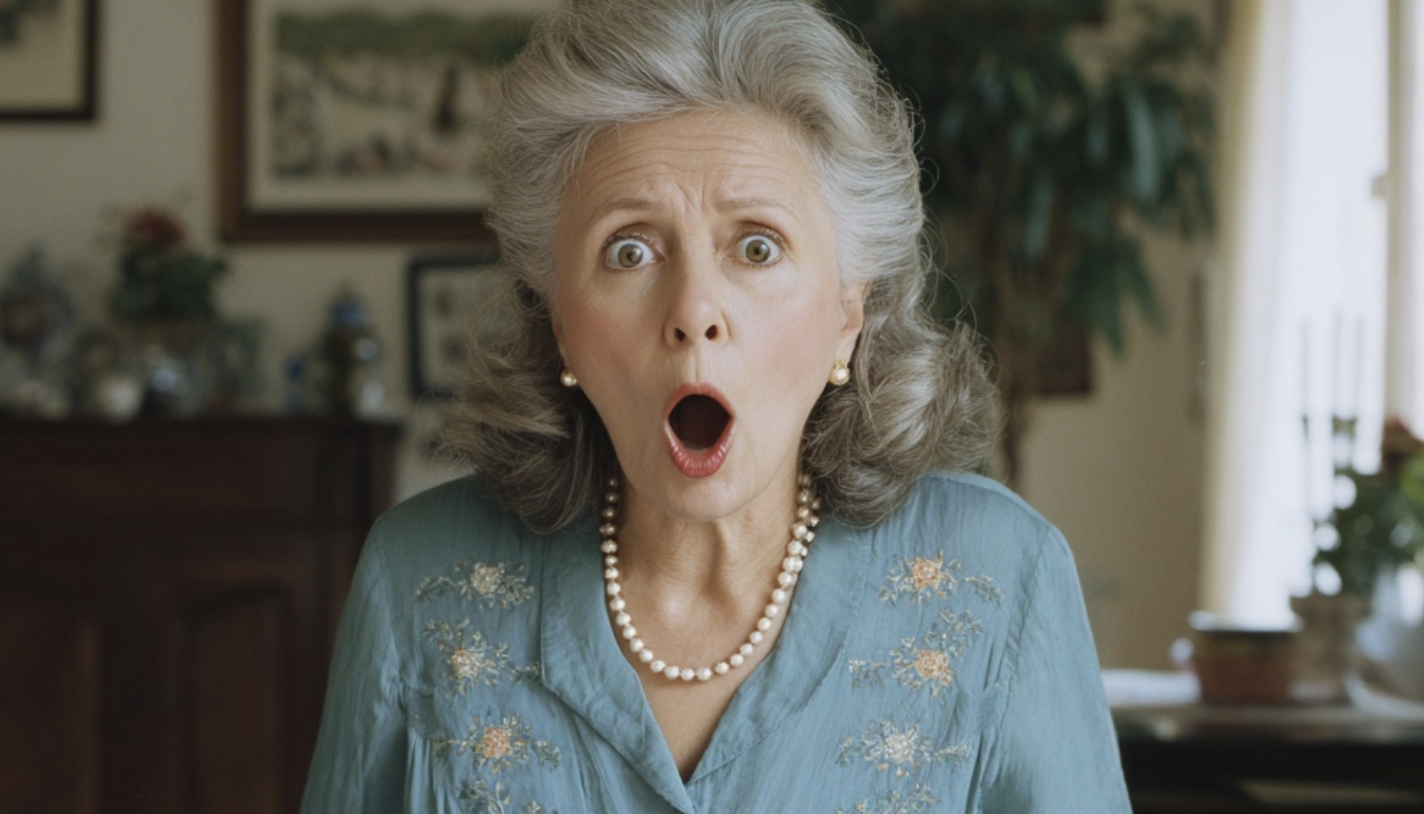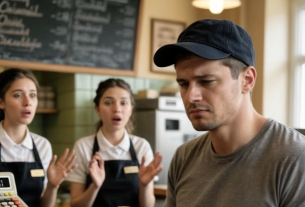Anna wiped the sweat from her forehead with the back of her hand, trying not to smear the kitchen towel with tomato sauce. Valentina Petrovna’s apartment was steeped in the aromas of garlic, basil, and stewed meat. Three pots bubbled on the stove at once: spaghetti boiled in one, minced meat with vegetables simmered for the Bolognese in another, and a rice side dish cooked in the third—just in case any of the guests didn’t like pasta.
— “Anya, dear, how are you doing in there?” came her mother-in-law’s voice from the living room. “Do you want a hand?”
— “Everything’s fine, Valentina Petrovna!” Anna called back, though help wouldn’t have hurt. But she knew: the moment her mother-in-law stepped into the kitchen, she’d start fussing—moving pots around, salting what was already salted—and in the end only get in the way.
Anya had been living with her husband Dima in his mother’s apartment for six months. After the wedding, the young couple had planned to rent a place, but Valentina Petrovna insisted: why waste money on rent when you could save for a down payment on your own apartment? The logic was ironclad, and Anna agreed, though deep down she understood—living with a mother-in-law isn’t easy.
At first, things went fairly well. Valentina Petrovna, a woman in her fifties with a shock of dyed blonde hair and a taste for bright outfits, welcomed her daughter-in-law warmly. True, it very quickly turned out that all the housework now fell entirely on Anna’s shoulders. Cooking, cleaning, laundry—everything became her responsibility. The mother-in-law explained it simply: “You’re young, you’ve got more energy. I’m tired after my life.” Anna didn’t object. First, she really did want to please her husband’s mother. Second, she understood: Valentina Petrovna had raised her son alone, worked two jobs, and now that she had a chance to rest—why not? Besides, Anna herself liked to cook and keep the house in order.
Today was a special day—her mother-in-law’s birthday. Valentina Petrovna had asked Anna to help organize a dinner for two of her friends, Lyudmila and Tamara. “Make something special,” she’d asked. “I want to show the girls what a wonderful daughter-in-law I have.” Anna decided not to skimp on ingredients. At the store she bought good meat for the mince, quality tomatoes for the sauce, and expensive spaghetti made from durum wheat. “Makarony po-flotski”—navy-style pasta—was her mother-in-law’s favorite dish, although what Anna was making had little in common with classic spaghetti Bolognese. But if that was the request, then that’s what it would be.
By six o’clock the table was set: a white tablecloth, the best dishes, candles in pretty holders. Anna had even bought flowers—white chrysanthemums, which she placed in a vase in the middle of the table. A semi-sweet wine—another weakness of the birthday girl—was chilling in the fridge.
Valentina Petrovna emerged from the bedroom in a new dress—bright blue, with a deep neckline and puffed sleeves. Her hair was piled high and liberally sprayed. A strand of imitation pearls shimmered at her neck.
— “Ah, Anya, it’s gorgeous!” the mother-in-law exclaimed, clapping her hands. “Simply stunning! The girls will be green with envy.”
Dmitry, back from work, praised the table and his wife, kissed his mother on the cheek, and went to his room—no male company was expected tonight.
Lyudmila and Tamara arrived exactly at seven, just as arranged. Both women were about the same age as the mother-in-law, but while Valentina Petrovna still kept herself up, her friends had long since given up on that. Lyudmila, short and plump, looked like a roly-poly doll in a gaudy dress. Tamara was taller and thinner, but her face, with its small features and perpetually disgruntled expression, didn’t invite much sympathy.
— “Valya, dear, happy birthday!” the guests chirped, handing over gifts—a box of chocolates and a bottle of cheap perfume.
At first the atmosphere at the table was festive. The women sang the food’s praises, especially the spaghetti Bolognese.
— “Anya, darling, this is divine!” Lyudmila smacked her lips, winding pasta onto her fork. “Where did you learn to cook like this?”
— “At home,” Anna answered modestly. “My mother taught me everything.”
Valentina Petrovna poured wine into the glasses. Then more. And more. The women’s cheeks turned pink, their voices grew louder, their laughter rang brighter.
— “Girls,” the mother-in-law began, already quite tipsy, “do you know how lucky I am? To find a daughter-in-law like this! I practically took her in, pulled her out of the village, taught her everything.”
Anna frowned. She was from a large city of over half a million people; calling it a “village” was a stretch. And it wasn’t the mother-in-law who had “pulled her out”—Anna herself had come to Moscow after university, found a job, and met Dmitry.
— “Of course, of course,” Lyudmila nodded. “You can tell she’s a well-brought-up girl. Not like some brides these days.”
— “And you, Valya, where are you from originally?” Tamara asked.
— “I’m a native Muscovite,” Valentina Petrovna replied proudly, though Anna knew she’d come to the capital from a Moscow-region town right after school.
The wine flowed like water. The women grew drunker, and the conversation took an unpleasant turn. Feeling herself the mistress of the situation, Valentina Petrovna began to let herself go.
— “So what do they have in that little village of yours?” she snorted, casting Anna a sidelong glance. “Your parents probably live in a cowshed and slurp cabbage soup with their bast shoes. Bet they finished three grades of the parish school. If that.”
All three burst out laughing.
Anna went cold. Her father was an engineer, her mother a math teacher. Both had higher education—cultured people.
— “And your mama,” the mother-in-law barreled on, “probably sold the last cow to send her daughter to the big city. So she wouldn’t get knocked up in some hayloft by a drunk tractor driver!”
Lyudmila and Tamara giggled. Their flabby sides wobbled obscenely with laughter.
— “Valentina Petrovna,” Anna said quietly, “you’re wrong.”
— “Oh, I’m wrong, am I?” the mother-in-law snapped. “I could tell right away what kind of family you come from! Just look at your hands—never used to real work. Surprised you all didn’t keel over in your own filth. Your mama too, I bet, liked to fool around.”
Valentina Petrovna leaned forward, the edge of the table pressing into her low neckline, and winked at her friends, as if hinting at something.
At that moment Anna’s patience snapped. Her mother, Nadezhda Ivanovna, had worked at a school all her life, taught children, helped them get into university. She was a wise, kind woman who raised her daughter to love and respect people. And to listen to a drunken mother-in-law drag her name through the mud…
Anna rose slowly from the table. In front of her sat a plate of spaghetti Bolognese—the very “navy-style pasta” she had labored over.
— “Valentina Petrovna,” she said evenly, “you’re not talking about my family right now. You’re describing your own life, aren’t you? But I won’t let you insult my mother.”
Before anyone could say anything, Anna lifted the plate and dumped its contents right onto her mother-in-law’s head. The spaghetti Bolognese spread over Valentina Petrovna’s elaborate hairdo with a disgusting squelch, slid down her face, snagged in her pearls, and trickled into the neckline of her dress. Bits of meat and tomato dotted the blue fabric, and the sauce blossomed into greasy stains.
Lyudmila and Tamara squealed and then burst into wild laughter. They howled out loud, their jiggling sides quivering like jelly.
— “And you two nasty toads—out, unless you want to be fishing pasta out of your hair too!” Anna shouted, turning to her mother-in-law’s friends.
The laughter died at once. Clutching their bags, Lyudmila and Tamara bolted for the door without even saying goodbye to the birthday girl.
Valentina Petrovna sat there, stunned. The last of the sauce dripped down her face, spaghetti dangled from her hair like tinsel. She opened and closed her mouth like a fish thrown up on the shore, unable to say a word.
Anna silently began clearing the table. Her hands trembled with anger—and with the realization of what she had just done. But she had no intention of regretting it.
Valentina Petrovna got up and, without a word, went to the bathroom to wash. Anna finished tidying the kitchen, did the dishes, and went to her room, where a bewildered Dmitry was already waiting—he’d heard the shouting but hadn’t dared intervene.
— “What happened?” he asked.
Anna told him. Her husband listened, shook his head, and hugged his wife.
— “Mom was wrong,” he said quietly. “But you overdid it too.”
— “Maybe,” Anna agreed. “But I’m not putting up with it anymore.”
The next morning Anna got up early, as usual, to make breakfast. In the kitchen, Valentina Petrovna was waiting for her. Her hair was carefully washed, though it still smelled faintly of tomato sauce. Her face looked drawn, her eyes were red—not from yesterday’s wine, but from tears.
— “Anya,” she said softly, “forgive me. I was a fool yesterday. I drank too much, my tongue ran away with me… I said horrible things.”
Anna stopped short of the stove.
— “You’re right,” the mother-in-law went on. “I was talking about myself. I really am from the countryside; my parents were simple people. And I’ve spent my whole life afraid someone would find out. I pretend to be a Muscovite, make things up. And yesterday… yesterday… you’re so successful, well-mannered, tasteful… I saw in you what I never was. Educated, from a good family. And I got jealous. That’s what spilled out.”
Anna said nothing. Her anger hadn’t entirely passed, but her heart was already thawing.
— “I know I was wrong,” said Valentina Petrovna. “And I know you had the right to put me in my place. Even… in that way.”
Anna couldn’t help smiling.
— “The spaghetti really did suit your hairstyle,” she said.
Her mother-in-law smiled too.
— “Tamara called later,” she said. “Said I got what I deserved. And Lyudmila added that my daughter-in-law’s got backbone. ‘She’s the right kind,’ she said.”
— “Let’s start over, Valentina Petrovna,” Anna said. “But on one condition: no one humiliates anyone. And we split the housework evenly.”
— “All right,” her mother-in-law nodded. “And… maybe you’ll show me how to cook real Bolognese? My navy-style pasta doesn’t hold a candle to yours.”
— “With pleasure,” Anna replied. “Just—next time, be more careful with your words. It’s easier to eat from a plate than from a neckline.”
Valentina Petrovna laughed—warmly and genuinely for the first time in a long while.
— “I promise. Though I’ll admit—I slept poorly, dreaming all night about washing sauce out of my hair.”
From that day on, a different mood settled in the house. Valentina Petrovna stopped playing the queen, and Anna stopped playing the meek Cinderella. They cooked together and cleaned together. The mother-in-law turned out to be good company when she wasn’t putting on airs as a “native Muscovite.” And the recipe for real Bolognese became a family treasure—though every time Anna made it, Valentina Petrovna would joke:
— “Just, please, serve it on a plate. Not on my head.”



